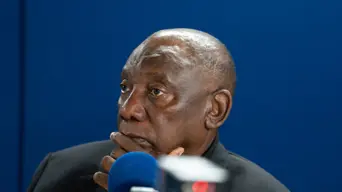Phala Phala worker admits hiding $580 000 in couch. Says Ramaphosa knew
Sara-Jayne Makwala King
16 September 2025 | 10:48A Phala Phala farm employee has testified that he stashed $580 000 under a couch in December 2019 and that he told President Ramaphosa about it.

FILE: President Cyril Ramaphosa in studio with 702's Clement Manyathela on 20 May 2024. Picture: Xanderleigh Dookey-Makhaza/Eyewitness News
Africa Melane (in for Lester Kiewit) speaks with defence attorney William Booth about new evidence in the Phala Phala case.
Listen below:
An employee working at the Phala Phala game farm in Limpopo, owned by President Cyril Ramaphosa, has admitted to hiding $580 000 in a couch at the property in December 2019.
The man is the first state witness to give testimony in the ongoing trial of three people facing various charges connected to the break-in at the farm in February 2020, in which the money was stolen.
The employee told the court that he had informed Ramaphosa that he had placed the money, from the sale of 20 buffalo, under the cushions of the couch for safekeeping.
The theft only came to light in mid-2022, and the President denied any wrongdoing.
Following Monday's revelations, Melane asks, what does the law say about a President’s obligation to declare large sums of cash at his residence, and whether failure to do so is illegal?
Booth says it's important to look at the case in context.
"We don't know what evidence there is in the police docket... that docket was submitted to the director of prosecutions in the area of Limpopo and the decision was made in regard to the President that they would not be prosecuting him."
- William Booth, defence attorney
Booth explains that based on the information gathered by the police, the prosecutors must decide whether there is a reasonable prospect of a successful prosecution.
"My view would be, if evidence comes out during this trial, that is reliable evidence, they could reconsider the decision."
- William Booth, defence attorney
Booth adds that the added element of suspicion arises with the hiding of the money in the couch.
"Everybody would think, well, why is it hidden in a couch... if you get a cash payment and not a bank transfer, then one would think you're going to put it in a safe or put that into your bank account. That has always been a bit of a question mark."
- William Booth, defence attorney
According to the employee, who worked as an acting lodge manager at the time, he moved the cash from the safe to the main house for safekeeping.
"... the President knew about it... so there's new information that the NPA could look at and say... we're going to reconsider our decision."
- William Booth, defence attorney
Booth says that with this new information, new charges could potentially come, among them for money laundering.
"But that is only where the money comes from illegal activity."
- William Booth, defence attorney
"And then, of course, dealing with the Tax Act, dealing with contraventions, not declaring income."
- William Booth, defence attorney
The trial continues.
ALSO READ: Sars opens criminal case against Phala Phala buffalo buyer Hazim Mustafa
Scroll up to the audio player to listen to the interview.
Get the whole picture 💡
Take a look at the topic timeline for all related articles.
Trending News
More in Local

22 September 2025 16:57
NHLS aiming to implement digital pathology to address cancer diagnosis backlog

22 September 2025 16:51
Masemola: SAPS has identified some of SA's most notorious crime suspects as the 'Big Five'

22 September 2025 16:31
Case against 4 ex-cops accused of jewellery heist in CT moved to Wynberg Regional Court










